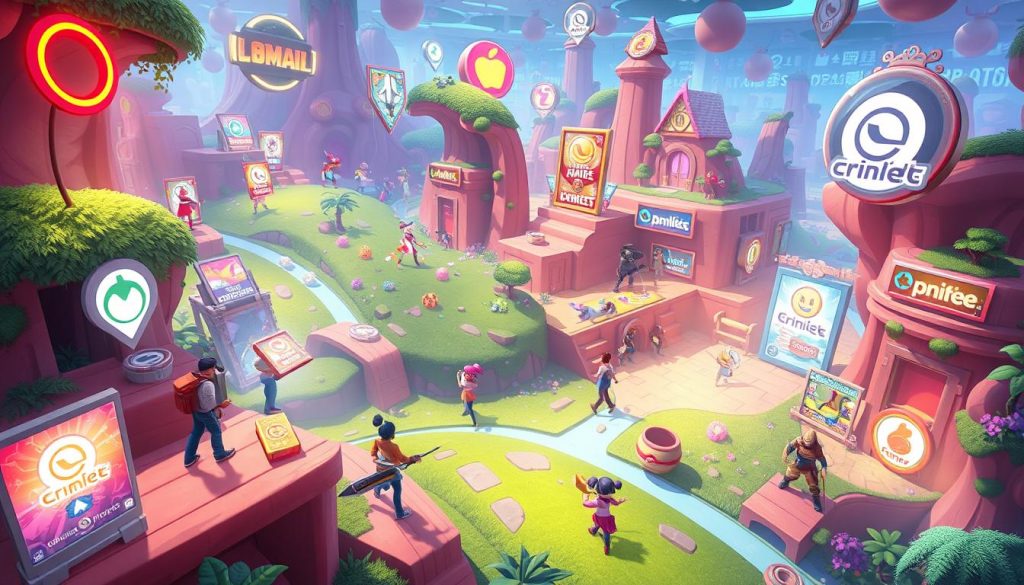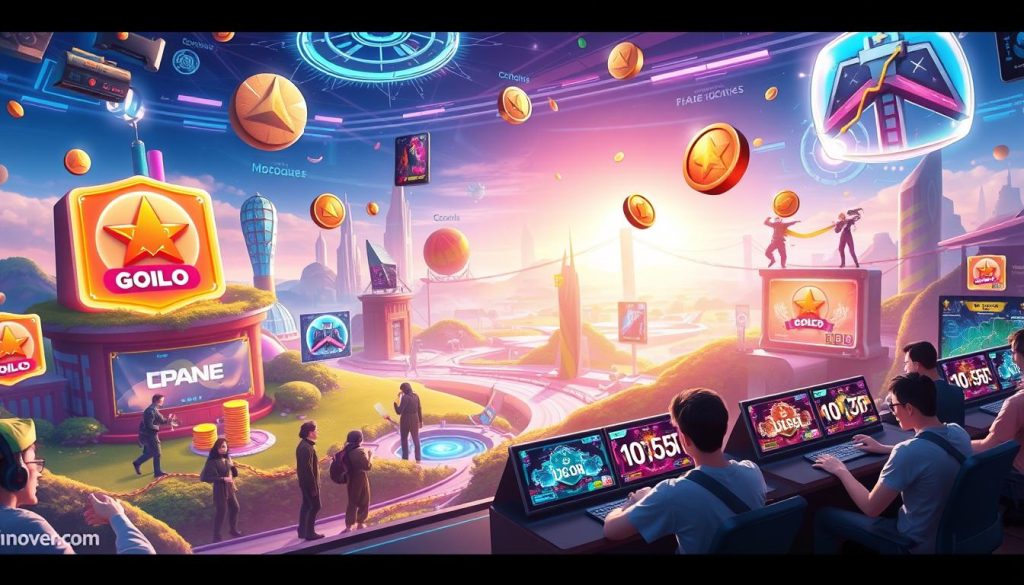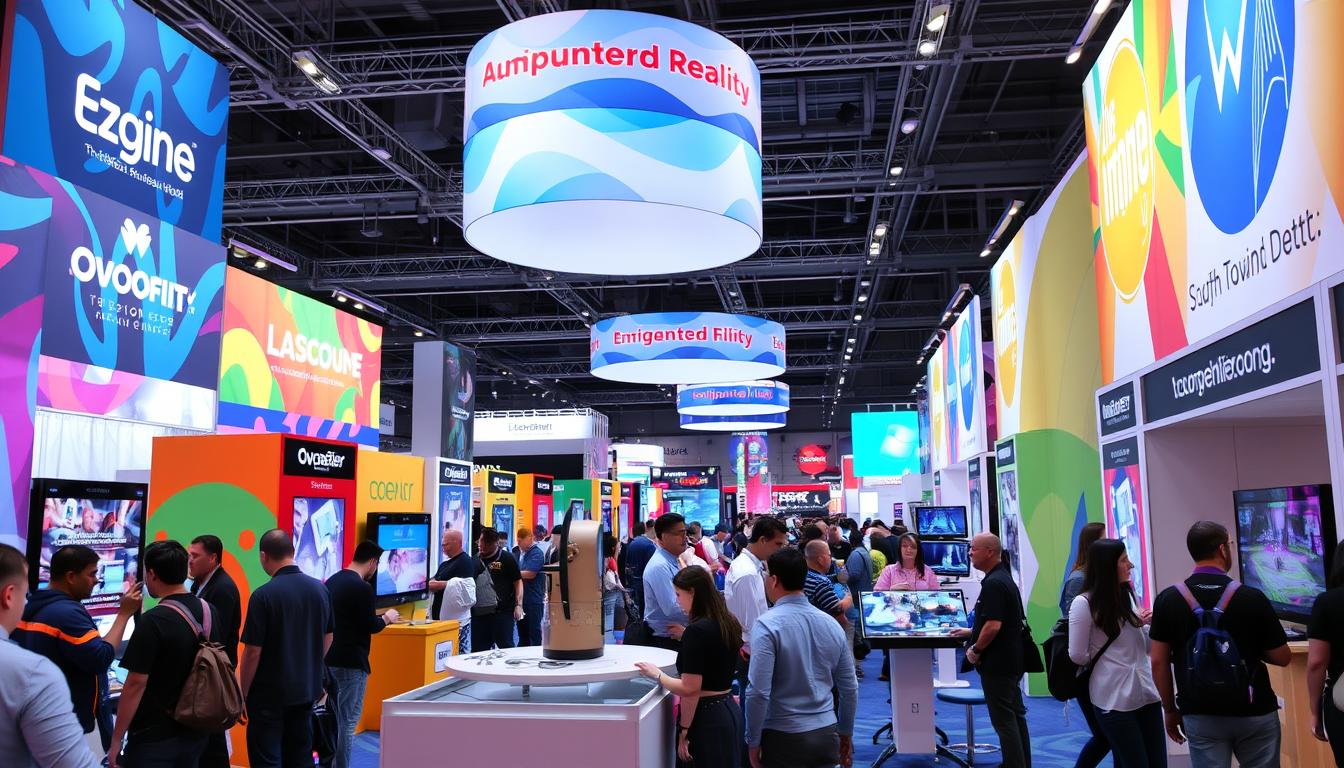In today’s fast-paced trade show world, standing out is crucial. Branded games have become a game-changer in experiential marketing, offering a fresh way to grab attention and leave lasting impressions. These interactive brand experiences are not just fun; they’re powerful tools for boosting engagement and visibility at your booth.
Trade show engagement has evolved beyond traditional handshakes and brochures. Visitors now crave immersive experiences that stick with them long after the event ends. By incorporating branded games into your booth strategy, you’re not just participating in the event – you’re creating a magnetic pull that draws attendees in and keeps them engaged.
These interactive elements do more than entertain; they open doors for meaningful conversations, lead generation, and brand recall. In a sea of exhibitors, your booth becomes a destination, not just another stop on the floor. It’s time to level up your trade show presence and make branded games your secret weapon for success.
Key Takeaways
- Branded games enhance booth engagement and visibility
- Interactive experiences create memorable brand impressions
- Games facilitate meaningful attendee conversations
- Experiential marketing through games boosts lead generation
- Interactive elements set your booth apart from competitors
- Games contribute to long-term brand recall post-event
Understanding the Power of Interactive Brand Experiences
Interactive brand experiences are revolutionizing the way companies connect with their audience. These engaging encounters go beyond traditional marketing, creating lasting impressions that resonate with consumers. Brand Activation through interactive experiences is becoming essential for businesses looking to stand out in a crowded marketplace.
The Psychology Behind Interactive Engagement
Interactive engagement taps into our basic psychological needs for connection and participation. When brands offer immersive experiences, they create emotional bonds with consumers. This deeper connection leads to increased brand loyalty and positive associations.
How Games Create Lasting Brand Memories
Games are powerful tools for Immersive Brand Storytelling. They capture attention, stimulate multiple senses, and create enjoyable experiences that people remember. By incorporating brand elements into games, companies can embed their message in a fun, interactive format that sticks in the mind long after the game ends.
The Impact on Customer Perception
Interactive brand experiences significantly shape customer perception. When consumers actively engage with a brand through games or other interactive elements, they form Memorable Brand Impressions. These positive interactions can lead to:
- Increased brand recall
- Higher perceived value
- Greater likelihood of purchase
- Improved customer loyalty
By leveraging the power of interactive experiences, brands can create lasting connections with their audience, driving both short-term engagement and long-term brand success.
| Interactive Experience Type | Impact on Brand Perception | Customer Engagement Level |
|---|---|---|
| Branded Games | High Positive Impact | Very High |
| Virtual Reality Demos | Strong Positive Impact | High |
| Interactive Kiosks | Moderate Positive Impact | Medium |
| Social Media Contests | Mild Positive Impact | Medium to High |
Why Branded Games Are a Must-Have for Your Expo Booth
In today’s competitive trade show landscape, branded games have become essential for boosting booth performance. These interactive experiences create a magnetic pull, drawing attendees to your space and keeping them engaged longer. By incorporating gamification in events, you’ll stand out from the crowd and leave a lasting impression on potential clients.
Trade show engagement skyrockets when visitors participate in fun, branded activities. Games provide a unique opportunity for brand activation, allowing you to showcase your products or services in an entertaining format. This approach not only increases dwell time at your booth but also helps build stronger connections with your audience.
“Gamification in events can increase booth traffic by up to 30% and lead generation by 40%.”
Let’s explore the key benefits of incorporating branded games into your expo strategy:
- Differentiate your brand from competitors
- Increase visitor dwell time
- Gather valuable data insights
- Create memorable experiences
- Boost lead generation
| Metric | Without Games | With Branded Games |
|---|---|---|
| Average Booth Visit Duration | 2-3 minutes | 5-7 minutes |
| Lead Capture Rate | 15-20% | 30-40% |
| Brand Recall | 30% | 60% |
By leveraging gamification in events, you’ll create a dynamic and engaging trade show presence that sets your brand apart. Branded games not only entertain but also educate visitors about your offerings, making your expo booth a must-visit destination.
Transforming Booth Traffic Through Gamification
Gamification is revolutionizing trade show engagement. By turning your booth into an interactive playground, you can skyrocket booth traffic generation and supercharge your lead generation strategies.
Creating a Magnetic Pull to Your Space
Imagine a booth that pulls visitors like a magnet. That’s the power of gamification. Interactive games create buzz, drawing crowds and sparking curiosity. A well-designed game can turn your booth into the talk of the trade show, ensuring a steady stream of visitors eager to participate.
Measuring Foot Traffic and Engagement Metrics
Games offer a unique advantage in measuring booth success. Track participation rates, game completion times, and high scores to gauge engagement. These metrics provide valuable insights into your booth’s performance and help refine your trade show strategies.
Converting Visitors into Qualified Leads
The real magic happens when game participants become qualified leads. Design your games to collect relevant data, turning casual players into potential customers. This approach enhances your lead generation strategies, making follow-ups more targeted and effective.
By leveraging gamification, you’re not just increasing foot traffic; you’re creating memorable experiences that resonate long after the trade show ends. This innovative approach to booth engagement can significantly boost your ROI, making it a must-have strategy for your next event.
| Metric | Without Gamification | With Gamification |
|---|---|---|
| Booth Visits | 100 | 250 |
| Average Time Spent | 2 minutes | 8 minutes |
| Lead Conversion Rate | 10% | 25% |
Designing Effective Brand-Centric Games
Creating brand-centric games that captivate your audience requires a perfect blend of entertainment and brand messaging. Interactive Brand Experiences are at the heart of this strategy, allowing companies to engage customers in memorable ways.

When designing games for your expo booth, consider these key elements:
- Align game mechanics with brand values
- Incorporate brand colors and logos subtly
- Create challenges that reflect your product benefits
- Ensure the game is easy to understand and play
Immersive Brand Storytelling is crucial in game design. Your game should tell a story that resonates with your target audience while reinforcing your brand message. This approach creates a lasting impression and increases customer retention long after the event ends.
Gamification in Events goes beyond mere entertainment. It’s about creating an experience that educates and engages participants. Consider incorporating leaderboards, rewards, and social sharing features to amplify engagement and extend your reach beyond the expo floor.
| Game Element | Brand Impact | Engagement Level |
|---|---|---|
| Trivia Challenge | Educates about products | High |
| Virtual Product Demo | Showcases features | Medium |
| Puzzle Solving | Reinforces brand imagery | Very High |
Remember, the goal is to create a game that’s not only fun but also effectively conveys your brand’s unique value proposition. By striking this balance, you’ll create Interactive Brand Experiences that leave a lasting impression on expo attendees.
Lead Generation Strategies Through Interactive Gaming
Interactive gaming at trade shows offers a powerful way to boost lead generation strategies. By blending fun with business, companies can create memorable brand activations that drive engagement and capture valuable data.
Data Collection Methods
Games provide a unique opportunity to gather information. Players often willingly share contact details and preferences in exchange for gameplay or prizes. This data can be collected through:
- Registration forms
- In-game surveys
- Social media integrations
Qualification Process Integration
Smart game design can seamlessly incorporate lead qualification. By asking targeted questions or offering choices that reveal interests, games can sort leads based on their potential value. This approach enhances trade show engagement while streamlining the sales process.
Follow-up Strategy Implementation
The real magic happens after the event. A well-planned follow-up strategy turns game interactions into lasting relationships. Consider these tactics:
- Personalized emails referencing game performance
- Special offers based on in-game choices
- Invitations to exclusive post-event webinars
By leveraging game data for post-event marketing, companies can create tailored experiences that resonate with leads long after the trade show ends. This approach not only boosts conversion rates but also enhances overall brand activation efforts.
Maximizing ROI with Branded Games
Branded games are a game-changer in Experiential Marketing. They offer a unique way to boost your Return on Investment (ROI) at trade shows. Let’s explore how these interactive experiences can transform your Brand Activation efforts.

Trade Show Engagement skyrockets when you introduce branded games. Visitors spend more time at your booth, increasing the chances of meaningful connections. This extended interaction translates to better lead quality and higher conversion rates.
To measure the success of your game-based marketing, track these key metrics:
- Booth traffic volume
- Average time spent at your booth
- Number of leads generated
- Social media mentions and shares
- Post-event survey responses
Optimize your game design to align with specific business goals. For example, if lead generation is your primary objective, create a game that requires contact information to play. This strategy ensures you capture valuable data while providing an entertaining experience.
“Branded games at trade shows can increase lead capture by up to 30% compared to traditional methods.”
Balancing costs with benefits is crucial. While developing a custom game might seem expensive, the long-term gains often outweigh the initial investment. Consider reusable game concepts that can be adapted for multiple events, spreading the cost over time.
By leveraging branded games in your Experiential Marketing strategy, you’re not just playing around – you’re seriously boosting your ROI.
Technology Integration and Platform Selection
Choosing the right tech for your branded games can make or break your Interactive Brand Experiences. Let’s dive into the essentials of hardware, software, and mobile options to boost your Booth Traffic Generation.
Hardware Considerations
Picking the perfect hardware is crucial for Gamification in Events. Touchscreens, VR headsets, and motion sensors can create immersive experiences. Large displays draw attention, while tablets offer portability. Consider durability and ease of setup when selecting your gear.
Software Solutions
The right software brings your branded games to life. Look for platforms that offer customization, real-time analytics, and seamless integration with your CRM. Some top choices include:
- Unity for 3D game development
- HTML5 for web-based games
- Adobe Creative Suite for graphic design
Mobile Integration Options
Mobile integration extends your reach beyond the booth. Develop a strategy that includes:
- QR codes for easy game access
- Social media sharing features
- Push notifications for engagement
| Technology | Pros | Cons |
|---|---|---|
| VR Headsets | Immersive experience | Higher cost, space requirements |
| Touchscreens | Intuitive, interactive | Potential for screen damage |
| Mobile Apps | Wide reach, portability | Development time, compatibility issues |
By carefully selecting your tech stack, you’ll create unforgettable Interactive Brand Experiences that drive Booth Traffic Generation and leave a lasting impression on your audience.
Case Studies: Successful Brand Activations Through Gaming
Brand activation through gaming has become a powerful tool for creating memorable brand impressions. Let’s explore real-world examples of how companies, both large and small, have leveraged this strategy to boost their marketing efforts.
Fortune 500 Implementation Examples
Major corporations have embraced experiential marketing through branded games. Coca-Cola’s virtual reality experience at trade shows allowed visitors to “step inside” a refreshing bottle, creating a unique brand connection. This innovative approach led to a 25% increase in booth traffic and a 40% rise in social media mentions.
Small Business Success Stories
Smaller companies have also found success with branded games. A local bakery chain introduced a digital “Cake Decorator” game at food expos, letting visitors design virtual cakes. This fun activity resulted in a 50% boost in lead generation and a 30% increase in post-event sales.
Metrics and Results Analysis
The impact of brand activation through gaming is measurable. On average, companies implementing interactive games at expos saw:
| Metric | Improvement |
|---|---|
| Booth Traffic | 35% Increase |
| Lead Quality | 20% Higher |
| Brand Recall | 45% Better |
| Social Media Engagement | 60% Growth |
These results highlight the effectiveness of branded games in creating lasting impressions. By integrating social media with marketing platforms, companies can further amplify their reach and engagement.
The success of these case studies underscores the power of experiential marketing in today’s competitive landscape. Businesses of all sizes can benefit from incorporating interactive elements into their brand strategies, creating memorable experiences that resonate with their target audience.
Future Trends in Experiential Marketing Games
The landscape of experiential marketing is evolving rapidly, with Interactive Brand Experiences taking center stage. As technology advances, we’re seeing a shift towards more immersive and engaging booth experiences at trade shows and events.
Virtual and augmented reality are set to revolutionize Gamification in Events. These technologies allow brands to create fantastical worlds or enhance real environments, providing unforgettable experiences for attendees. Imagine stepping into a virtual product demonstration or interacting with 3D holograms of brand mascots!
Artificial intelligence is another game-changer in the realm of Immersive Brand Storytelling. AI-powered games can adapt in real-time to user preferences, creating personalized experiences that resonate deeply with each participant.
“The future of experiential marketing lies in creating seamless, personalized journeys that blur the lines between digital and physical worlds.”
Social media integration is becoming increasingly sophisticated. Brands are developing games that encourage sharing and viral content creation, amplifying their reach beyond the event itself.
| Trend | Impact on Brand Engagement | Implementation Complexity |
|---|---|---|
| VR/AR Games | High | Medium |
| AI-Powered Experiences | Very High | High |
| Social Media Integration | Medium | Low |
As these trends shape the future of experiential marketing, brands must stay agile and innovative to capture attention and create lasting impressions in an increasingly competitive landscape.
Conclusion
Branded games have become a game-changer for expo booths, revolutionizing trade show engagement. These interactive experiences create lasting brand memories and transform ordinary booth spaces into bustling hubs of activity. By implementing branded games, businesses can significantly boost their brand activation efforts and stand out in crowded exhibition halls.
The power of interactive brand experiences lies in their ability to captivate audiences and create meaningful connections. Through gamification, companies can attract more visitors, collect valuable lead data, and leave a lasting impression on potential customers. This innovative approach to marketing not only increases foot traffic but also enhances the overall quality of interactions at trade shows.
As we look to the future of experiential marketing, it’s clear that branded games are no longer just a nice-to-have – they’re a must-have for your expo booth. By embracing this trend, businesses can create immersive experiences that resonate with attendees long after the event ends. So, gear up to level up your trade show presence and watch as your brand takes center stage in the minds of your target audience.
FAQ
Why are branded games important for expo booths?
Branded games are crucial for expo booths because they enhance engagement, boost brand visibility, and create memorable impressions on attendees. They help you stand out in a competitive trade show environment, increase dwell time at your booth, and provide valuable data insights, making them an essential tool for experiential marketing.
How do branded games contribute to lead generation?
Branded games are powerful lead generation tools. They attract visitors to your booth, provide opportunities for data collection, and can integrate qualification processes. Games also create a natural environment for follow-up conversations, making it easier to convert casual attendees into qualified leads.
What types of games work best for trade show booths?
The best games for trade show booths are those that align with your brand values and marketing objectives while being fun and easy to play. Popular options include trivia games, virtual reality experiences, touch screen puzzles, or customized versions of classic games. The key is to ensure the game reflects your brand and engages your target audience.
How can I measure the ROI of implementing branded games?
You can measure the ROI of branded games by tracking metrics such as booth traffic, engagement time, lead quality, and post-event conversions. Compare these metrics to previous events or non-game booths. Also, consider the long-term value of increased brand awareness and improved customer relationships resulting from the interactive brand experience.
What technology do I need to implement branded games in my booth?
The technology needed depends on the type of game you choose. Common options include tablets, touchscreen displays, VR headsets, or even participants’ smartphones. You’ll also need game software, which can be custom-developed or purchased as a ready-made solution. Consider factors like booth space, budget, and your target audience when selecting technology.
Can small businesses benefit from branded games at expos?
Absolutely! Small businesses can greatly benefit from branded games at expos. Games level the playing field, allowing smaller companies to create engaging experiences that rival larger competitors. They’re an effective way to attract attention, make lasting impressions, and gather leads, which is particularly valuable for businesses with limited marketing budgets.
How do branded games enhance brand storytelling?
Branded games enhance immersive brand storytelling by creating an interactive narrative around your product or service. They allow attendees to engage with your brand in a hands-on way, making your message more memorable. Games can showcase your brand’s personality, values, and unique selling points in an entertaining and impactful manner.
What are some emerging trends in experiential marketing games?
Emerging trends in experiential marketing games include augmented reality (AR) integrations, AI-powered personalized experiences, social media-connected games, and sustainability-themed challenges. There’s also a growing focus on creating multi-player or team-based games that foster networking among attendees while engaging with your brand.


